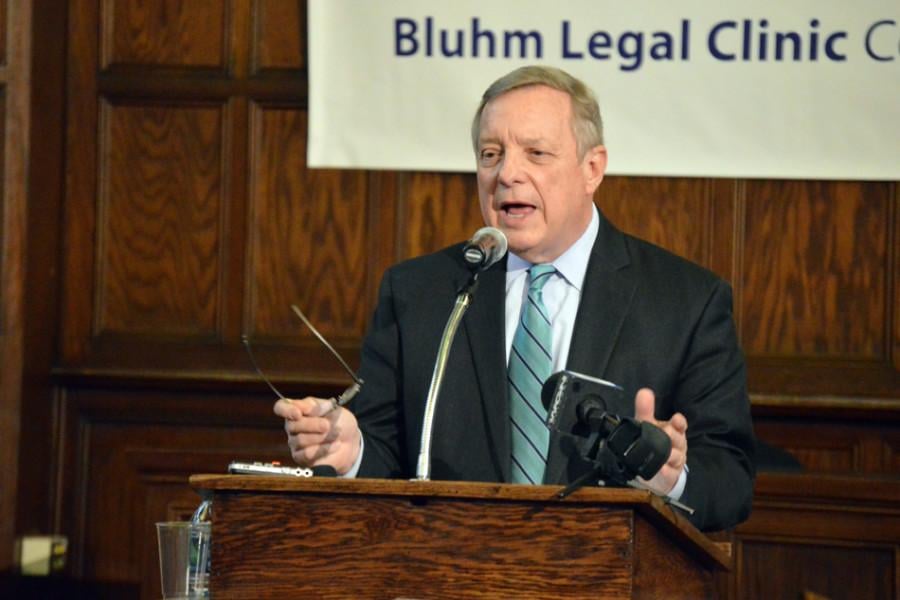Durbin seeks support from Northwestern law students for new human rights bill
Paige Leskin/Daily Senior Staffer
Sen. Dick Durbin (D-Ill.) speaks Wednesday to more than 100 people at Northwestern’s School of Law in Chicago. The senator called on law students to support a human rights bill he plans to introduce to Congress.
April 8, 2015
CHICAGO — Sen. Dick Durbin (D-Ill.) said Tuesday he would introduce to Congress a law that would allow the U.S. government to prosecute people who commit international crimes against humanity — and called on Northwestern law students for their support.
The bill would allow the U.S. to try people who have committed human rights violations in foreign countries and come to the United States to avoid punishment, Durbin said in a speech at the School of Law in Chicago to about 100 students, faculty and members of the public.
The new legislation, which initially failed in 2009, would fill a loophole in the nation’s laws on human rights, an issue that consistently needs, and receives, bipartisan support in Congress, Durbin said.
The law would allow for the prosecution in the U.S. of those who are convicted abroad of crimes against humanity, including slavery and ethnic cleansing.
“Even in hyper-partisan times, I found that practices that shock the conscience have the ability to bring together broad coalitions,” Durbin said. “This is a perilous time for human rights, which is why we need you, and we need smart talented lawyers like you, who are committed to defending those most basic rights.”
Durbin has long been involved with human rights issues as the former chairman of the Senate’s subcommittee on human rights.
In that position, Durbin said, he held hearings on human rights concerns both in the U.S.— such as solitary confinement, criminal justice and racial disparities — and abroad, including human trafficking and rape as a method of war.
In his four terms in the Senate, Durbin has championed bills to fight genocide and the use of child soldiers.
Yet Durbin emphasized that human rights violations are still a pervasive issue, pointing to the recent deaths at the hands of the Islamic State and the Ukrainian government as evidence. Just last week, al-Shabab, a Somali terrorist group, killed nearly 150 people at a university in Kenya and targeted students who identified as Christian.
Despite constant promises that human rights violations will be fixed, Durbin said history is evidence that more has to be done. The senator pointed to the constant cycle of genocides that occur, including the Holocaust, killings in Rwanda in 1994 and, more recently, executions in Syria.
“Crimes against humanity are still taking place on a sickening scale,” Durbin said. “This government is unable to persecute perpetrators of these crimes when they are discovered in America. This loophole has grave consequences.”
Durbin’s speech helped to “sensitize” NU law students to human rights law, an area many may not be made familiar with in their studies, said Law Prof. David Scheffer, who introduced Durbin to the crowd.
Currently the director of the Center for International Human Rights, Scheffer has previously served in various positions, including the U.S. Ambassador At Large for War Crime Issues, that have put him in the center of congressional discussion of human rights. Currently, a “gaping hole” exists in U.S. law that Durbin’s proposed bill would close, he said.
“Senator Durbin took this opportunity at Northwestern to emphasize and move forward an important piece of legislation in U.S. Congress,” Scheffer told The Daily.
He echoed Durbin’s call for bipartisan effort to push the proposed bill into law.
When the bill was first introduced in 2009, a Republican congressman blocked the law with concerns it would “compromise American sovereignty.”
However, Durbin said he wanted to work toward “legislation, not lamentation” and get the bill passed this time around.
“The Crimes Against Humanities Act would give the U.S. prosecutors the ability to prosecute and punish those committing these unspeakable crimes,” he said.
The choice of the senator — a leader in law and politics regarding human rights — to speak at NU was valuable to some in the crowd, including Pedro Pizano.
The first-year law student, enrolled in a joint-degree human rights program, said he chose NU’s law school for opportunities like hearing Durbin speak.
“We should have the opportunity to ask the tough questions,” Pizano said. “Senator Durbin is trying to be clear about why we should care in this country (about human rights).”
Email: pl@u.northwestern.edu
Twitter: @paigeleskin



